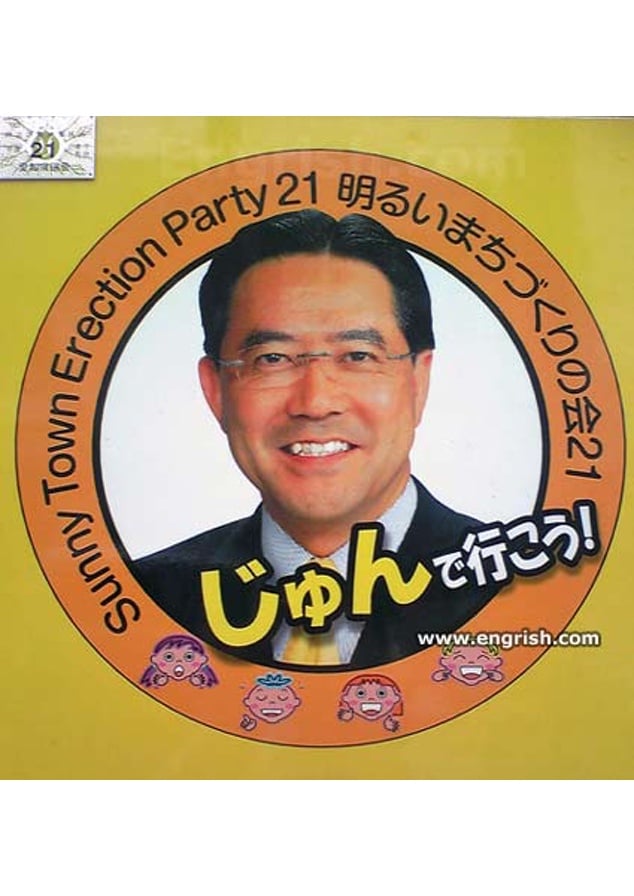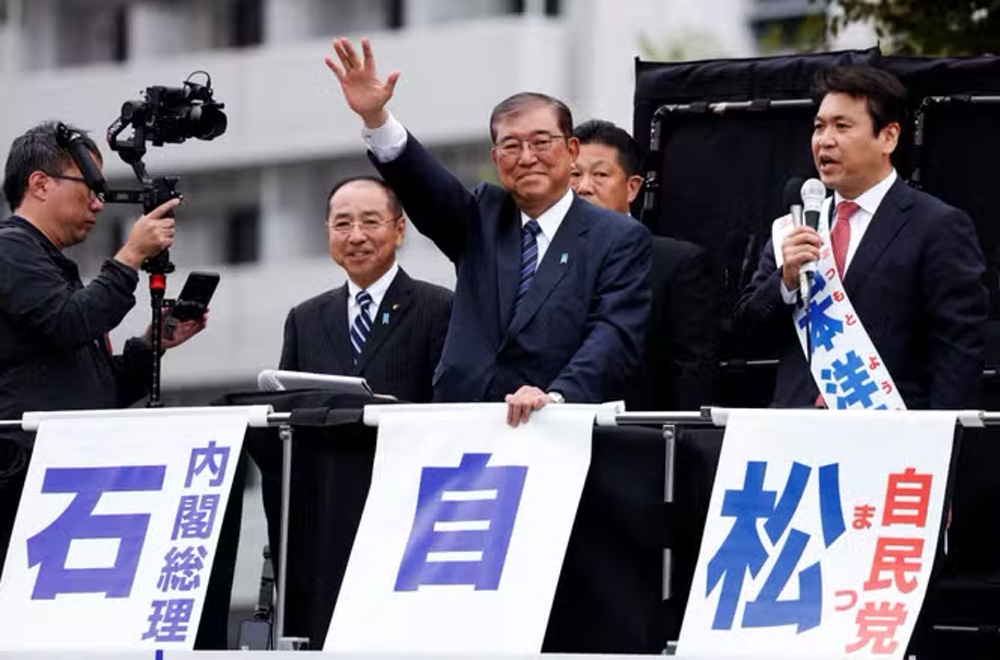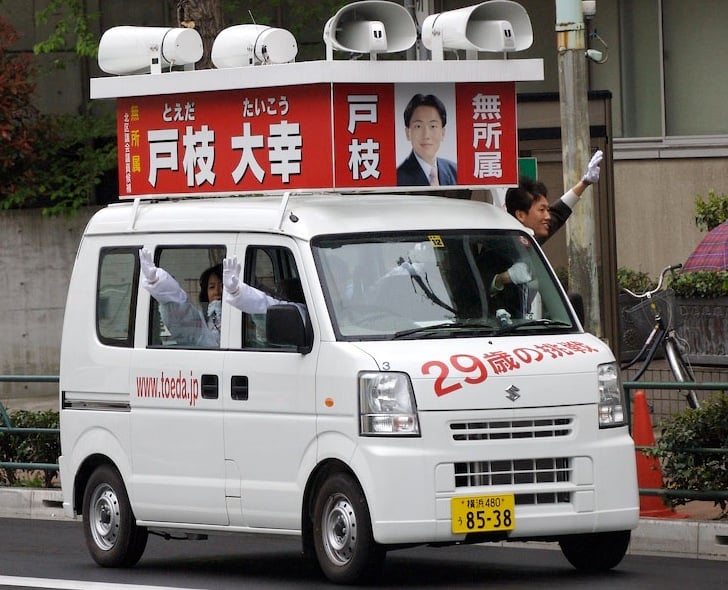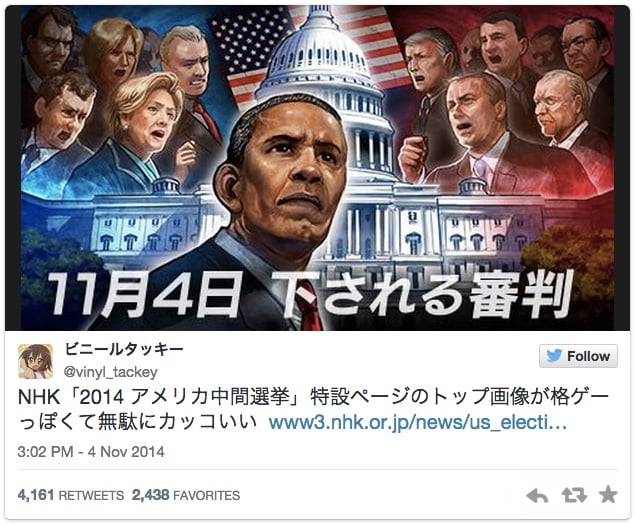Have you been following the big election? Not the US election that happens tomorrow. I’m talking about the Japanese General Election held on October 27. As Americans head to the polls this week, let’s check in to see what’s happening in Japanese politics, and how Japan views American US elections!
Life can be stressful, but happily, J-List is here to help you relax with a flash January Ero Toy Sale, giving you a huge 18% off all our stock of stress toys for men. This is a great opportunity to buy, so start browsing here!
How Do Elections Work in Japan?
Two weeks ago, I went for a walk with Mrs. J-List to a restaurant in our neighborhood. As we walked back, we encountered a huge group of thirty or so elderly people in front of our local community center, including my mother-in-law (age 83). Only one thing can bring out such a crowd in our neighborhood: a politician must be coming! And sure enough, the local Liberal Democratic Party (LDP) representative was about to show up to give a speech ahead of the upcoming general election.
Although Japan’s loveable “military otaku” Prime Minister Shigeru Ishiba finally attained the position of Prime Minister of Japan after nearly four decades of hard work, he might be losing this position soon. That’s because the LDP, Japan’s largest political party, failed to win a majority due to public anger over a political funding scandal. Currently, the party is trying to build a new coalition, but unless it can find common ground with one of the other parties, it might end a nearly perfect streak that began in 1955. Since then, the LDP has only been out of power between 1993 and 1994, and from 2009 to 2012.
Japanese elections are among the more annoying aspects of living in Japan due to the loudspeaker trucks that drive around with politicians inside shouting, “I am Yamada! I will work hard for you! Please support me in the upcoming election!” from dawn til dusk. Happily, there seem to be fewer and fewer of these annoyances on the roads as Japan’s elections move onto the Internet.
(These election loudspeaker cars apparently used to exist in the US because we see them in Back to the Future. I’m glad they aren’t common today.)


Japanese Elections Are Highly Regulated
My impression of Japan’s elections is that they’re highly regulated. Some examples of this include:
- Candidates must present official posters that are displayed in designated public areas so voters can learn their names and party affiliations.
- The number of political flyers each candidate can print is regulated by law. Until a few years ago, using Twitter/X for campaign purposes was theoretically illegal because each view a Tweet received could count as a political flyer for campaign purposes. Increasingly, campaigning is being done on Twitter and YouTube.
- Campaign finances are tightly controlled, and all donations must be reported accurately. Politicians are regularly charged when they don’t follow the rules.
- Only Japanese citizens are allowed to participate in the election process. Individuals can contribute up to 1.5 million yen (around US$10k) to a candidate or party in a year. Corporations are banned from any involvement in politics.
- One of the rationales for the existence of NHK, Japan’s public broadcasting network, is to provide equal coverage to all political parties in a balanced manner. This theoretically helps level the playing field between large and small parties and improves the quality of Japan’s democracy.
What happened when Japan gave Prime Minister Abe a state funeral. Read this blog post!
How Are the US Elections Followed in Japan?
US elections are followed closely, with Japanese reporters traveling to swing states to report what they see on the ground. This is despite Japan being on the other side of the world from Washington D.C. The unique system the US uses to elect its leaders is naturally confusing to Japanese viewers, so the news media carefully explains the workings of the Electoral College (which is 大統領選挙人団 in Japanese if you’re curious). They also make over-the-top graphics for their election coverage, like this “Street Fighter II” inspired poster from 2014.
And the day after election day, when the electoral votes are being declared for each candidate, Japanese newscasters will be following along, state-by-state.
Thanks for reading this blog post about the recent Japanese election and how Japan views the US election. We wish everyone in the US a peaceful election day!
Let’s Chat
You made it to the end of this post! Thank you! As a token of our appreciation, enjoy an extra 5% off your next order when you use the code BLOG at checkout. Also, don’t forget to follow J-List on all our platforms!
- Twitter / X, where Peter posts anime booba for you
- Bluesky, where we post several times a day
- Facebook, where we used to share memes and discuss anime
- Discord, if you want to chat with other J-List customers of culture
Life can be stressful, but happily, J-List is here to help you relax with a flash January Ero Toy Sale, giving you a huge 18% off all our stock of stress toys for men. This is a great opportunity to buy, so start browsing here!



















